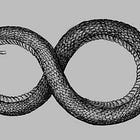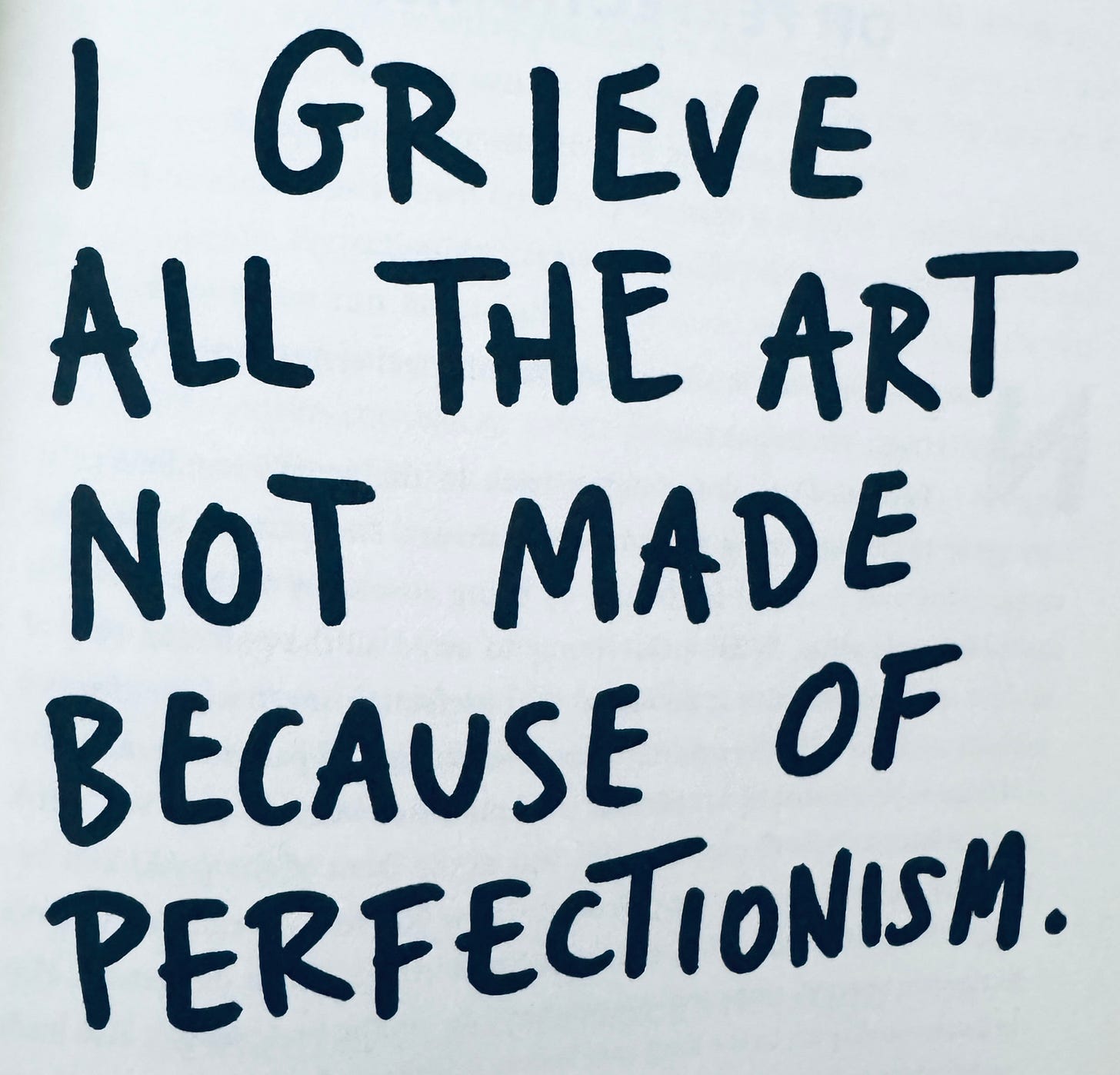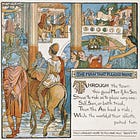🤥 My Most Toxic Trait, Part Three
Why does the thought of reading fifteen minutes of free writing aloud make me want to crawl out of my skin?
Catch up on part one and part two first:
“Denying art is denying your nature. The act of creation makes a better version of you. It gives you purpose, agency, and challenge. It demands that you explore the caverns of who you are and discover what lives within—the beautiful and the messy.”
After five months deliberating via open browser tabs, I finally joined my friend Terri’s writing community, New Rules Studio, in March. There are three to four Zoom sessions every week, and members can drop in at any time to as many as they’d like.
Within each session, the instructor leads a brief grounding meditation, shares a prompt, and then participants write quietly for fifteen minutes. In the second half, randomly selected readers share their work aloud and receive feedback on the strongest elements, often specific lines that hold power and aliveness for listeners.
The format of these Studio sessions is inspired by the Gateless Method, founded by Suzanne Kingsbury, and participants must follow a few foundational ground rules:
No disclaiming before reading aloud (e.g. “This is so bad,” or “I barely wrote anything,” etc.)
No criticizing, questions, or suggestions on another person’s work
Focus on what is working in what we hear
Stay on the page with the writer; do not comment in self-referential ways (e.g. I can totally relate . . . I’m also a ______, this one time, I . . . )
Say “the speaker” or “the narrator,” rather than referring to the name of the person reading aloud. The reader does not need to respond to the feedback.
For the first two months after enrolling, I didn’t join a single session.
In months three and four, I joined, but could barely write. Oftentimes, the instructor would give a prompt, and I would stare blankly at my screen for fifteen minutes, nothing arising at all. Just tossing bad ideas back into the bin. I felt empty. (In caving to the blinking cursor, I failed another Gateless principle: start writing no matter what, even if you write about having nothing to say.)1
Then, even on days when I did manage to scribble something, I would pray not to be called on. As randomly selected readers (thankfully braver than I) shared their work, I went against another Gateless objective by mentally comparing my hypothetical, discarded topics to their real ones, berating myself for such superficial and inadequate story ideas, almost as if validating that it was better I hadn’t written anything after all.
Similarly, during the three-day workshop at Omega, over the course of a dozen instruction blocks throughout the weekend, she had us free-write and then read in pairs (already mortifying). During that time, Cheryl walked around the room, randomly tapping a few people each time to share on a microphone with the several hundred attendees in person and online. Despite the fact that she’s one of my writing sheroes, I remember thinking—with full conviction—that even if Cheryl herself asked me to read to the larger group, I would say no. Thank goodness she didn’t; my invisibility cloak worked.
When I learned that one of my favorite New Rules Studio instructors recently moved five blocks away, we scheduled a walk-and-talk. Toward the end, she gently inquired as to why I hadn’t read anything aloud yet, asking what was getting in my way. The first time she had called on me, a week earlier, I declined. I hadn’t written anything that day, anyway, so there would have been nothing to read.
The idea of reading aloud, even to a group of twenty-five generous fellow writers who are instructed to only react to what’s positive about the piece, seemed—still seems—terrifying.
What am I so afraid of?
As we explored the question, I felt even more ridiculous, just as I do typing this out loud here and now. Let’s assume I read something terrible (disclaiming is already breaking the rules), and everyone in the Zoom room quietly snickers to themselves, judging me as a superficial hack (I’m really not giving my peers much credit here): SO WHAT?!
Why does the thought of reading fifteen minutes of free writing aloud make me want to crawl out of my skin?
In parts one and two of this mini-series, I shared more on this wanting-to-be-liked neurosis that follows me like a shadow. Still, it’s only 49 percent of the equation. It’s only fair to also shine a light on the 51 percent that keeps me hitting publish.
In contrast to part one, which had me spiraling for days, after part two went live, I was buoyed by a handful of encouraging comments. I felt proud, giddy even. I excavated a part of myself that I prefer to keep hidden, shared it with you, and the sky didn’t fall. I felt validated knowing that others feel this way too, and grateful to laugh together at these strange human flaws. When my fears can serve as a mirror or permission slip for you, and somehow light a small path forward for both of us, I am ecstatic. It’s what I feel I was put on this earth to do.
In hindsight, writing—and importantly, publishing—these essays, despite struggling with an overpowering, too-often debilitating craving to be liked, is the very activity that has pulled me through the last two years of tremendous uncertainty, a full-blown identity-quake I’m still experiencing aftershocks around. I am writing my way out.
Reflecting, writing, risking, publishing, cringing, hiding, and seeking—it’s all part of the process. And I must admit: the process itself is healing. captures the magic of this alchemical dance in her delightful new book, We Need Your Art: Stop Messing Around and Make Something:2
“For a long time, I wanted to tell stories. But I held the shameful belief that making art was frivolous, irresponsible, and embarrassing—that I should probably keep my hopes to myself. Still, I wrote. As I told my stories, something changed within me. Writing connected me to joy, to ambition, to rebellion and delight. These silly little stories were giving me purpose.”
In a chapter on self-censorship, she tackles the futility of seeking others’ approval:
“People pleasers will always struggle to make art because art will always ruffle feathers and never be to everyone’s taste. For the people-pleasing creative, every step of your journey is going to be in the name of regulating someone else’s emotions. That will exhaust you.”
“Stay alert to how you perceive your own art,” she says, “and if you find yourself constantly in the imagined mind of someone else, call yourself home.”
Before Amie releases work into the world, whether it’s an Instagram post or a novel, she asks herself the following three questions:
Have I been vulnerable?
Have I been generous?
Am I proud of this work?
If the answer is yes, “then I ground myself in that fact,” she writes, continuing:
“I give myself the validation before anyone else can give me validation. I pick myself. Then I let my art go. Press send. Press post. I release her. With this attitude, the external response or lack of response cannot affect my initial response to my work . . . it’s the same work that I approved of before I shared it, the same work that I loved.”
Is it possible to love something only after you know it resonates with an audience? Yes, I do this all the time. But it’s a hindrance to creating something new, not a help.3
❤️
P.S. I’d love to hear from you in our community Doh discussion thread for this series!
✍️ If you’re feeling bold (or extra blocked), try this dangerous disappearing method.
📙 ’s book and podcast (co-hosted with her husband ) are a must for all fellow creatives! I also loved their Bewildered podcast conversation with and :
One of my favorite lines: “I respectfully do not care (what you think).”
If you liked this post, you might also appreciate:


















If someone asked you to share your thoughts, insights, visions, questions. . .I doubt you'd feel the same trepidation just speaking casually. Someone once told me that reading something aloud was "frozen" language. Perhaps this feels unnatural to you and shows that you prefer spontaneity—or that with writing and having time to craft your message, you can work in the rhythms or nuances that make it feel natural, plus, it separates you from immediate "judgment"?
Jenny, I have been a people pleaser all my life, but now in my 8th decade, I realized that people pleasing is a sin against the self. Quoting from the Roman Catholic Act of Contrition, "...I firmly resolve with the help of Your Grace, to sin no more and to avoid the near occasion of sin." That said, there is a difference between people pleasing in general and being more consciously considerate of the people you love, and from your writing, I know that you know the difference.
Next, about reading free writing aloud...I have been very fortunate to participate in writing workshops with Lauren Camp, the Poet Laureate of New Mexico. After she gives us an autobiographical prompt, we write for 12 to 15 minutes and then each of us reads aloud. Her rule is that we provide "Call-backs"only; we call back to the writer the words and phrases that stood out to each of us. We only say the exact words/phrases, no opinions, no advice, just reflect back their own words. This helps not only the writer in question, but all of us as we can take some of the call-backs to others into our own work.
The pieces that are written in this context can sometimes touch on the death of children, devastating medical diagnoses, intentionally strategic emotional assassination by siblings as well as the memories of long lost loves. You can imagine the raw writing that is shared within this sacred circle.